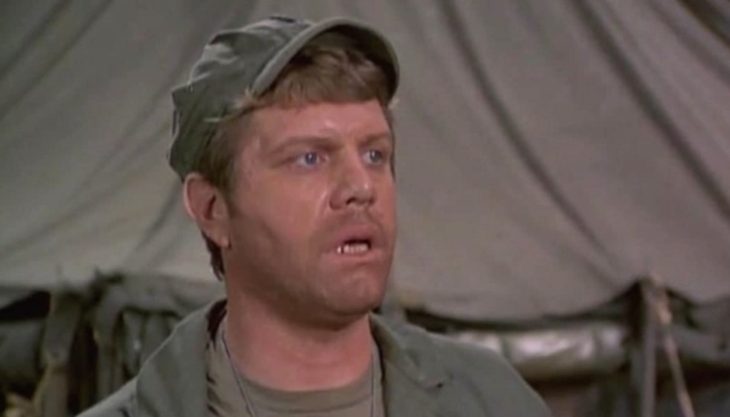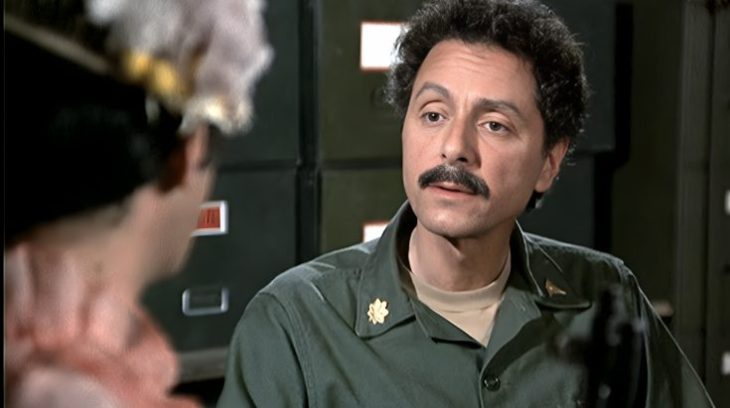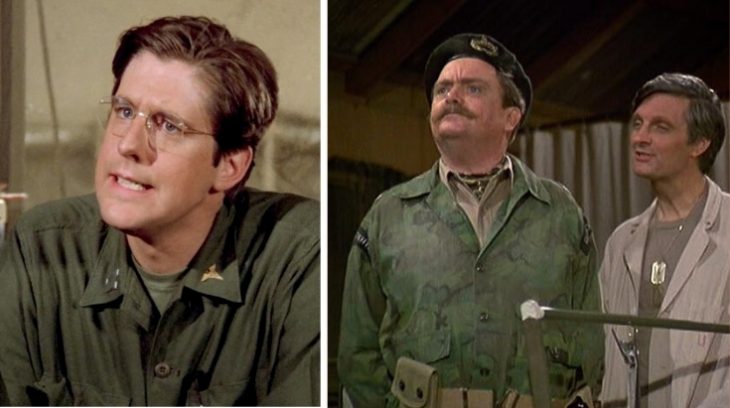During its eleven-year run, MASH employed many different writers, some of them part of a core team and others freelancers. Larry Gelbart, Gene Reynolds, Lawrence Marks, Ken Levine, and David Isaacs are among the core team of writers. Some of the funniest and oft-quoted MASH episodes were written by the dynamic duo, Jim Fritzell and Everett Greenbaum (The General Flipped at Dawn, that’s them). But sometimes, MASH actors also wrote episodes, either by themselves or as collaborators. Many people know that Alan Alda penned and directed many episodes. But he wasn’t the only one who wrote. Two other actors did, as well. Here are the MASH actors who wrote scripts, and the episodes they are responsible for.
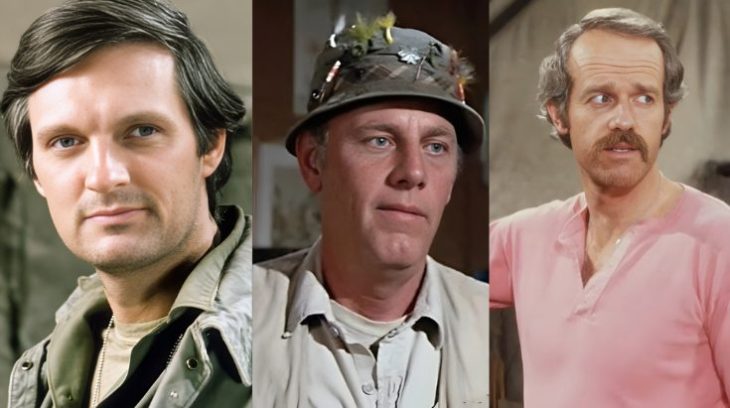
Alan Alda
There is no denying the impact that Alan Alda had on MASH, both on the evolution of his character, Hawkeye, and the show itself. Alda was the first actor to win Emmy awards for acting, writing, and directing on the same show. He won six Emmy Awards, six Golden Globe Awards, and three Tony Awards. He was nominated for an Academy Award and even a Grammy Award. In 1977, he won a Primetime Emmy for Outstanding Directing in a Comedy Series (Dear Sigmund – MASH Season 5, Episode 8). Then, in 1979, he won a Primetime Emmy for Outstanding Writing in a Comedy Series (Inga – MASH Season 7, Episode 17). He won three other Emmy Awards for acting on MASH, including Actor of the Year in 1974, among many other nominations.
This is just the tip of the iceberg of his numerous acting and directing accolades. He won three Directors Guild of America Awards (Outstanding Directorial – Comedy Series) for his work on MASH (Dear Sigmund, 1977; The Life You Save, 1982; Where There’s a Will, There’s a War, 1983).
I’ve already written about the first episode Alan Alda penned, The Longjohn Flap (a title he wasn’t thrilled about). In total, he wrote 19 episodes. Six of them were collaborations with other writers. He was one of the writers of the final episode, Goodbye, Farewell and Amen (a two-and-a-half-hour special).
19 MASH Episodes by Alan Alda
- The Long-John Flap (Season 1, Episode 19)
- Dr. Pierce and Mr. Hyde (Season 2, Episode 5, with Robert Klane)
- Dear Sigmund (Season 5, Episode 8)
- Hepatitis (Season 5, Episode 19)
- Fallen Idol (Season 6, Episode 2)
- War of Nerves (Season 6, Episode 4)
- In Love and War (Season 6, Episode 7)
- Comrades in Arms: Part 1 (Season 6, Episode 12)
- Comrades in Arms: Part 2 (Season 6, Episode 13)
- Dear Sis (Season 7, Episode 14)
- Inga (Season 7, Episode 16)
- The Party (Season 7, Episode 25 with Burt Metcalfe)
- Life Time (Season 8, Episode 11 with Walter D. Dishell, M.D.)
- Lend a Hand (Season 8, Episode 20)
- Dreams [story] (Season 8, Episode 22, teleplay** with James Jay Rubinfier)
- The Life You Save (Season 9, Episode 20 with John Rappaport)
- Follies of the Living – Concerns of the Dead (Season 10, Episode 10)
- Hey, Look Me Over (Season 11, Episode 1 with Karen Hall)
- Goodbye, Farewell and Amen (Season 11, Episode 16 with Burt Metcalfe, John Rappaport, Dan Wilcox & Thad Mumford, Elias Davis & David Pollock, and Karen Hall)
My opinion: I feel compelled to add my two cents in regards to Alan Alda’s writing on MASH since it was so extensive and noteworthy. The episodes Alan Alda wrote are some of the best writing, but some of the worst MASH episodes. He sometimes lost sight of the fact that, while MASH had dramatic elements and could be called a comedy-drama, it still needed comedy. Depressed or deeply troubled protagonists are never funny (angry, frustrated, sure, but not depressed). Alda seems to have been obsessed with Hawkeye cracking up or other characters being depressed and troubled. And, smothering a baby on a bus? Sure, it was based on a real incident, but come on, it’s a little over the line for a comedy-drama.
In Season 7, Episode 26, The Party, the unit retreats to a nearby cave to wait out a battle that the unit is caught between, and Hawkeye, it is suddenly revealed, has severe claustrophobia. It’s not enough to have the unit retreat to a cave, taking all the patients with them; Hawkeye has to have a near nervous breakdown. Yes, in my opinion, these “Hawkeye has a mental issue” episodes were tedious and maudlin. Any doctor who continually required psychiatric care would not have lasted long, despite the shortage of medical personnel. This zest to depict the reality of war was, frankly, unrealistic.
I consider his episode Dreams to be possibly the worst MASH episode ever, and many fans agree (although some like it). Fallen Idol is particularly troublesome (the one where Hawkeye calls Radar a ninny) as it tries to force a big character change that is then ignored by other writers or portrayed inconsistently. There was, after all, never a MASH encyclopedia for them to consult. It also, like other scripts he wrote, focused on a deeply troubled character. You just can’t make that funny.
The same can be said of Comrades in Arms, as the intimacy Hawkeye and Margaret shared and the deep friendship they seemed to gain had little impact on the episodes to follow, or at least not as much as would seem realistic. At the same time, all of this did help shape the future directions of the characters to some extent. None of it was funny, except for Hawkeye’s deer-in-the-headlights reaction to Margaret’s sudden devotion.
While I loved any episode with Sidney Freedman, a depressed or down Sidney was, again, not funny, and Alda did this TWICE.
One episode that particularly bugs me is Hey, Look Me Over, as any episode where the nurses are evacuated throws me out of the story. This was a completely unrealistic contrivance. There is no way nurses would ever have been evacuated from a medical unit!
And yes, it was Alan Alda who had, for some time, wanted to include a storyline about a mother smothering her baby on a bus to stop it from crying. It ended up in the final two-hour special, and, yes, it was jarring and compelling, but was it appropriate to the final episode of the most successful “comedy” series up to that time? I love so much about Hawkeye and Alan Alda, but he was quite adamant about his character, the show, and even the unit being “enlightened.” As writer Ken Levine once said, there was nothing enlightened about the US Army at that time. Some enlightenment is good, but total enlightenment is almost anti-comedic. So, yeah, while I both loved Hawkeye half the time and was annoyed by him the other half (as was intended, I think), I’m not a big fan of his writing for the show.
But while I have your attention, I would like to clear up something about how Alan Alda approached the writers in general on the show. That is, while he would push for certain things, he never insisted. He never staged a rebellion. He never tried to force the issue. If a line was drawn, he accepted it and respected it. That is why the baby on the bus incident never happened in the early years of the show, but only much, much later, when the show had evolved greatly after the departure of Larry Gelbart and Gene Reynolds.
What I love about Alda’s writing on the show is his generosity. He wrote for the other characters as much as he wrote for his own. He wanted everyone to shine, contrary to the uninformed opinion of many Hawkeye/Alan Alda haters. His first episode, The Longjohn Flap, was both absurdly funny and managed to feature every single regualr cast member.
And, while I complained about Hey, Look Me Over because it had the nurses being evacuated (I believe this happened twice), Alan Alda wrote this episode for Kellye Nakahara and, by so doing, gave her a more significant presence on the show. This may have never happened, but not for Alda’s generosity and commitment to the cast, according to the actor herself.
McLean Stevenson
While it’s no surprise that McLean Stevenson, who played Col. Henry Blake, was honored for his acting in MASH, few know that he was nominated for a writing award in 1974 (Best Writing in Comedy). That’s a notable achievement when you’re only responsible for two episodes. Both of them are thoroughly funny while still being grounded in the reality of a war and military life.
2 MASH Episodes by McLean Stevenson
- The Army-Navy Game [story*] (Season 1, Episode 20)
- The Trial of Henry Blake (Season 2, Episode 8)
My opinion: These are two of my favorite episodes. Trapper and Hawkeye trying to diffuse an unexploded bomb is ridiculous, but in just the right way. It’s not a documentary, folks! And, the Trial of Henry Blake manages to take a dramatic incident, Henry being up for a court-martial, and make it funny pretty much all the way through. Of course, being that the charges were filed by Frank and Margaret, we knew nothing would come of it (that’s sort of the point).
Mike Farrell
Mike Farrell didn’t write or direct nearly as much as Alan Alda, but his contributions are notable. He was nominated for a Directors Guild Award for Outstanding Directorial Achievement in a Comedy Series, as well as for a Primetime Emmy Award for Outstanding Writing for his episode Death Takes a Holiday.
4 MASH Episodes by Mike Farrell
- The Yalu Brick Road (Season 8, Episode 10)
- War Co-Respondent (Season 8, Episode 23)
- Death Takes a Holiday [teleplay**] (Season 9, Episode 5 with John Rappaport and Dennis Koenig)
- Run for the Money [story*] (Season 11, Episode 9 with Elias Davis & David Pollock)
My Opinion: Farrell’s episodes were grounded in the later tone of the show, with much more complex and dramatic storylines. He tended to focus on moral dilemmas and his plots were quite character-driven. That focus created some of the most talked-about moments on the show. Many still recall Charles’ defending of a soldier with a stutter, something that helped to show the character’s deeper nature and set him apart thoroughly from Frank Burns. The stellar acting of David Ogden Stiers didn’t hurt, though!
One of the most talked-about scenes in MASH is when Charles tells the stuttering soldier that he, too, loves to get lost in a top-notch Captain Marvel. Then, Charles gives a leather-bound edition of Moby Dick to Private Palmer, who is convinced he is stupid, and says, “This is worthy of your intelligence.” It gets me every time.
The Yalu-Brick Road is both funny and a bit unfortunate, since it features an Asian actor in a stereotypical role, and the idea of a North Korean soldier frantically trying to surrender to any Americans he encounters is, well, just a bit off. This is especially true since they would more likely encounter Chinese soldiers. It is a “cute” episode, but Hawkeye and B.J. treating the North Korean soldier (Soon-Tek Oh) they encounter while lost in the countryside like a pet and naming him Ralph is not my favorite MASH moment.
Farrell’s best contribution is undoubtedly on Death Takes a Holiday. In this episode, the doctors desperately try to keep a critically injured soldier alive just long enough so that he officially dies the day after Christmas. They wish to spare his family the memory of such a loss happening on Christmas day and thus associating the holiday with this tragedy. Like other Farrell stories, it focuses on the moral implications of the decisions the characters make, while showing the real cost of war and the doctor’s true heartfelt compassion.
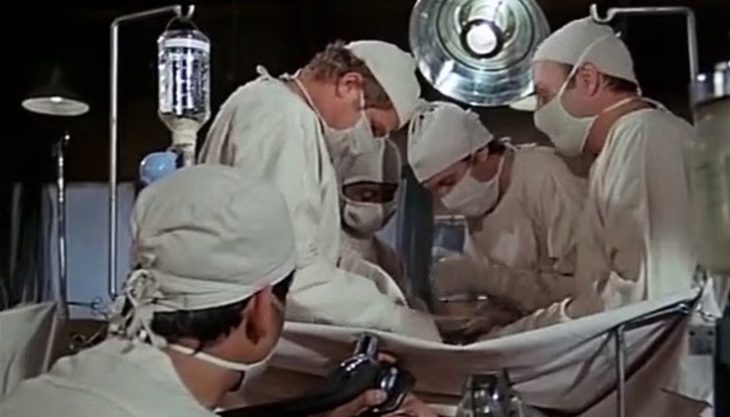
Did Harry Morgan Write Any MASH Episodes?
It is often reported that Harry Morgan is also one of the MASH actors who wrote episodes for the show. While Morgan directed several episodes, which makes sense given his immense experience before working on MASH, he never wrote any episodes. I suspect that the misunderstanding comes from lists of “Best Harry Morgan episodes.” These lists are meant to be the favorite episodes of Harry Morgan, not ones he wrote. The same thing happens with Alan Alda, causing him to be given credit for many episodes he did not write.
*Story indicates underlying narrative idea, theme, concept, or outline of the plot and character development. In other words: what happens.
**Teleplay is the fully formatted script, including all dialogue, scene directions, and technical instructions, used as a blueprint for a television production. In other words: how everything is filmed and performed.




